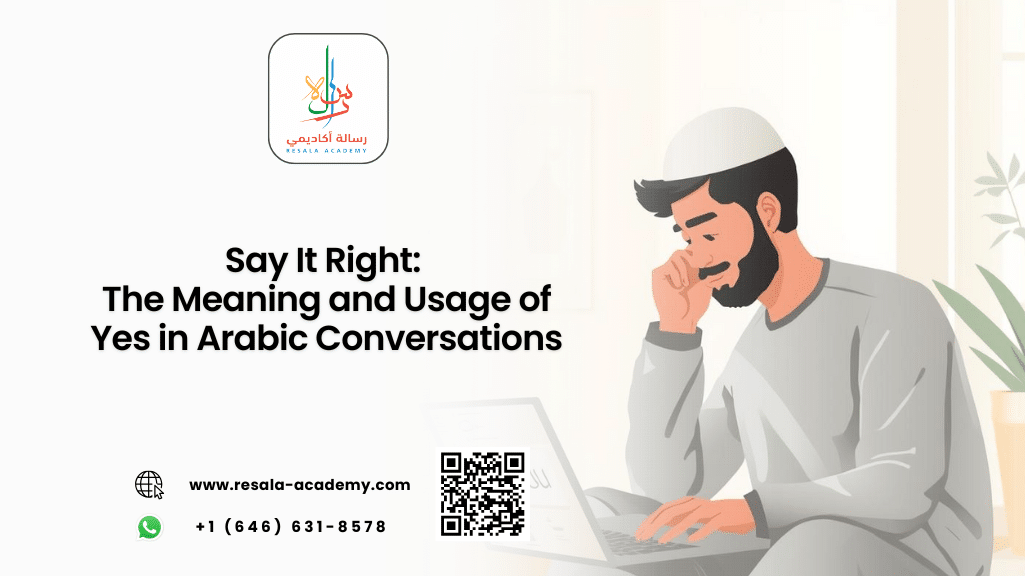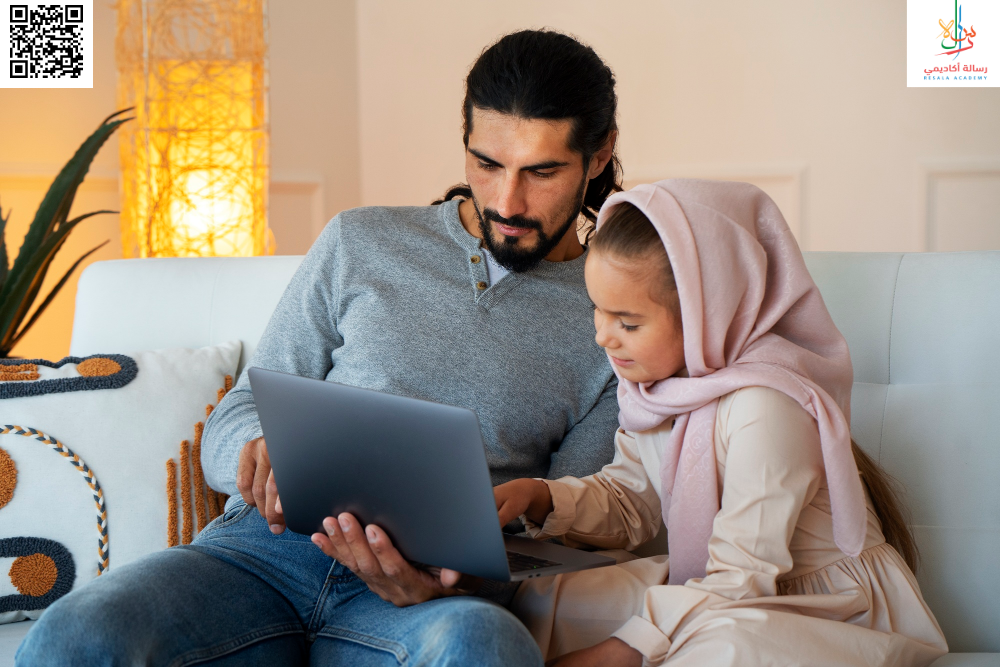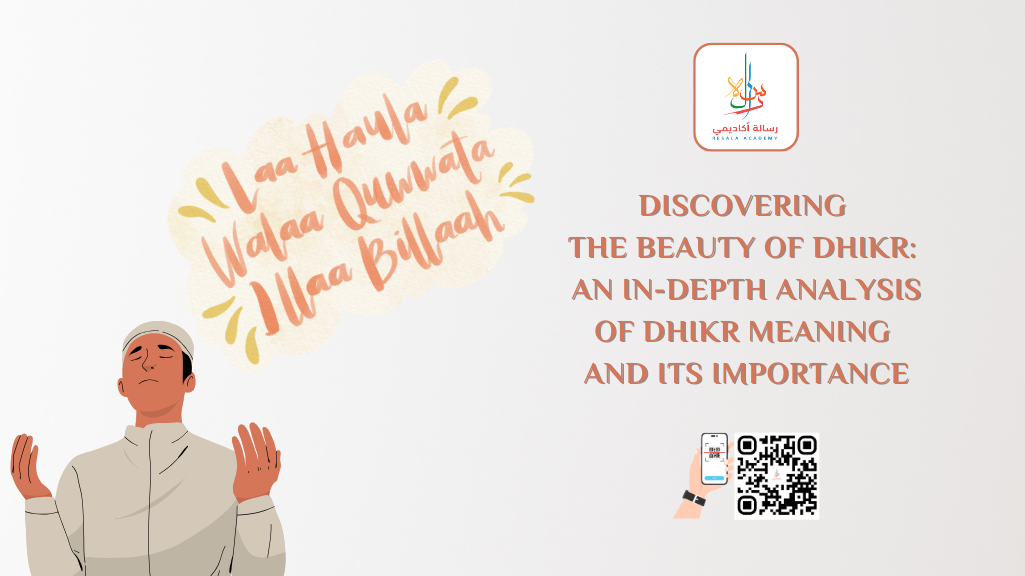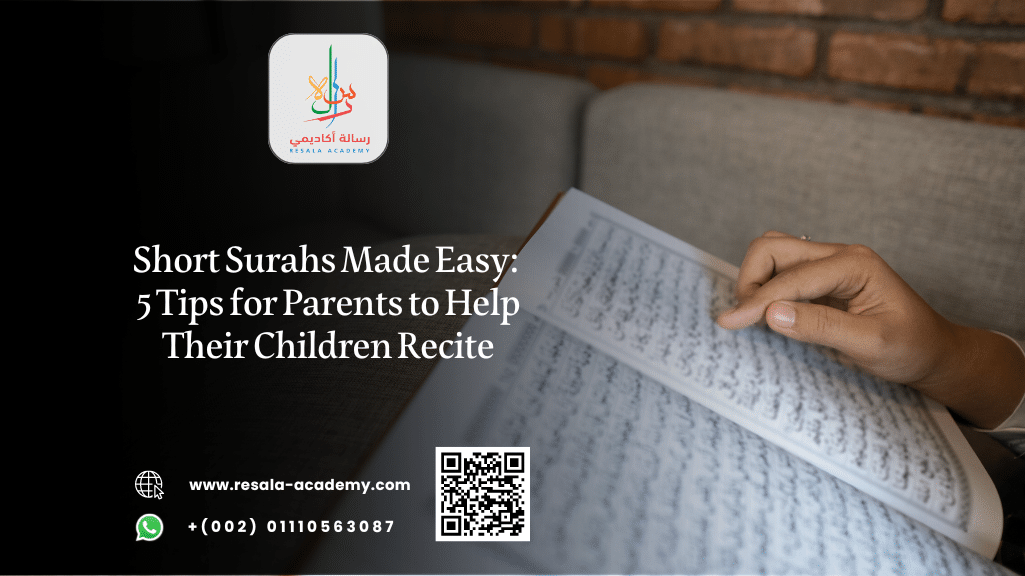Table of Contents
Say It Right: The Meaning and Usage of Yes in Arabic Conversations
Learning a new language is more than just memorizing vocabulary—it’s about understanding culture, context, and communication. One of the first words every language learner seeks to master is the word “yes.”
In this comprehensive guide, we’ll explore the meaning, usage, and cultural significance of saying yes in Arabic, helping non-native speakers navigate real-life conversations with confidence.
Whether you’re traveling to the Middle East, studying Arabic for religious purposes, or simply passionate about languages, this article will equip you with everything you need to know about affirming correctly in Arabic. Plus, we’ll introduce you to Resala Academy, a leading online platform for learning Arabic and Quran for non-native speakers.
Understanding “Yes” in Arabic
The most common and direct translation of yes in Arabic is:
نعم (pronounced: naʿam)
This word is used in both formal and informal settings and is understood across all Arabic-speaking countries. It’s the equivalent of the English “yes” and is appropriate in most situations.
But Arabic is a rich and diverse language with many dialects and cultural layers. So, while نعم is the standard, it’s not the only way to say yes.
Different Ways to Say Yes in Arabic
Depending on the region, context, and level of formality, there are several ways to express affirmation in Arabic. Below are the most common variants:
1. نعم (naʿam) – Standard Arabic
- Used in formal speech, writing, and Modern Standard Arabic (MSA)
- Universally understood across the Arab world
- Appropriate in academic, religious, and professional settings
Example:
- Arabic: هل تحب القهوة؟ نعم، أحبها.
- English: Do you like coffee? Yes, I do.
2. أيوه (aywa) – Egyptian and Levantine Dialects
- Informal and conversational
- Common in Egypt, Jordan, Lebanon, Syria, and Palestine
- Friendly and casual tone
Example:
- Arabic: عايز تروح معايا؟ أيوه!
- English: Do you want to come with me? Yes!
3. إي (ee) – Levantine Dialect
- Very informal
- Used in Syria and Lebanon
- Often used among friends and family
Example:
- Arabic: خلصت شغلك؟ إي.
- English: Did you finish your work? Yes.
4. طبعاً (ṭabʿan) – Of Course / Certainly
- Means “of course” or “certainly”
- Used to express strong agreement or enthusiasm
- Slightly more expressive than a simple “yes”
Example:
- Arabic: هل ستأتي إلى الحفل؟ طبعاً!
- English: Will you come to the party? Of course!
Read more about: Learn Arabic Online: Your Ultimate Roadmap from Zero to Fluent
5. أجل (ajal) – Classical / Literary Arabic
- Found in religious texts and classical literature
- Less common in modern speech
- Used in poetic or formal religious contexts
Example:
- Arabic: أجل، هذا ما قاله النبي.
- English: Yes, that is what the Prophet said.
Cultural Nuances and Contexts
In Arabic-speaking cultures, communication is deeply rooted in politeness, respect, and context. Saying “yes” isn’t just about the word itself—it’s about how and when you say it.
Key Cultural Tips:
- Tone matters: A sharp “yes” may seem rude; a warm tone is preferred.
- Non-verbal cues: Nodding, smiling, and eye contact enhance affirmation.
- Indirectness: In some contexts, people may say “yes” out of politeness, even if they mean “no.” Understanding context is crucial.
Example:
- Question: هل تستطيع مساعدتي؟
- Literal Answer: نعم (Yes)
- Real Meaning: I want to help, but I may not be able to.
This cultural subtlety is why learning Arabic through a structured program like Resala Academy is invaluable. Their expert instructors help learners understand not just the language, but the cultural context behind it.
Yes and No in Arabic: A Quick Comparison
Understanding both affirmation and negation is essential. Here’s a quick reference:
| English | Arabic | Pronunciation | Usage |
|---|---|---|---|
| Yes | نعم | naʿam | Standard |
| Yes | أيوه | aywa | Informal |
| No | لا | lā | Standard |
| No | لأ | laʾ | Informal |
Learning both yes and no in Arabic helps you navigate conversations with clarity and confidence.
Common Scenarios and Examples
Let’s explore how to say yes in Arabic language in real-life situations:
Accepting an Invitation
- Arabic: هل تريد الذهاب إلى السينما؟ – نعم، أود ذلك.
- English: Do you want to go to the cinema? – Yes, I’d love to.
Answering a Question Politely
- Arabic: هل تعمل هنا؟ – نعم، أنا موظف هنا.
- English: Do you work here? – Yes, I’m employed here.
Agreeing with Someone
- Arabic: الجو جميل اليوم، أليس كذلك؟ – نعم، إنه رائع.
- English: The weather is nice today, isn’t it? – Yes, it’s wonderful.
Religious Context
- Arabic: هل تؤمن بالله؟ – أجل، أؤمن به.
- English: Do you believe in God? – Yes, I do.
Deepening Your Understanding: The Role of “Yes in Arabic” in Quranic and Islamic Contexts
Understanding how to say yes in Arabic is not only vital for everyday communication but also plays a significant role in religious and Quranic contexts. The affirmation of truth, agreement with divine will, and expressions of obedience are often conveyed through various forms of “yes” in classical Arabic. These usages go beyond simple conversation and reflect deeper spiritual meanings.
- Quranic Affirmation: In the Quran, affirmations such as أجل (ajal) and بلى (balā) are used to confirm truths or respond to rhetorical questions, often with profound theological implications.
- Spiritual Submission: Saying “yes” in Arabic during prayers or religious discussions often symbolizes submission to Allah’s will, highlighting the importance of correct usage in Islamic studies.
- Formal Recitation: Students of Quranic Arabic at institutions like Resala Academy learn how classical affirmatives differ from modern dialects, ensuring accurate understanding during recitation and interpretation.
- Contextual Sensitivity: In religious discourse, using the appropriate form of “yes” (e.g., نعم vs. بلى) can reflect a learner’s depth of knowledge and respect for the sacred text.
Dialectal Diversity: How “Yes in Arabic Language” Varies Across the Islamic World
Arabic is spoken across more than 20 countries, each with its own dialectal flavor. For learners aiming to communicate effectively in different regions, understanding how to say yes in Arabic language across dialects is essential for both linguistic accuracy and cultural integration.
- North African Variants: In Morocco and Algeria, you might hear نعم replaced with آه (ah) or واي (way), especially in Berber-influenced dialects—nuances taught in advanced courses at Resala Academy.
- Gulf Arabic Usage: In Gulf countries like Saudi Arabia and the UAE, ايه (ayeh) is used informally, while نعم remains the formal standard in religious and official settings.
- Sudanese Arabic: Learners may encounter أيوة (aywa) with a distinct intonation, reflecting Sudan’s unique blend of Arabic and African linguistic influences.
- Learning Strategy: Resala Academy’s curriculum includes exposure to regional dialects, helping students not only understand how to say yes in Arabic but also when and where to use each variation appropriately.
These specialized insights enable learners to go beyond the textbook and engage with Arabic as a living, breathing language shaped by faith, geography, and culture.
Why Learn Arabic with Resala Academy?
Learning how to say yes in Arabic is just the beginning. To truly master the language, you need structured guidance, cultural immersion, and expert instruction. That’s where Resala Academy’s Arabic course online comes in.
What Makes Resala Academy Stand Out?
✅ Specialized in teaching Arabic and Quran to non-native speakers
✅ Native Arabic instructors with years of experience
✅ Flexible online classes tailored to your level and schedule
✅ Interactive learning with real-life conversations
✅ Focus on Modern Standard Arabic and dialects
Whether you’re a beginner or an advanced learner, Resala Academy provides a comprehensive, engaging, and culturally-rich learning experience.
Say Yes to Success: Join Resala Academy Today!
Are you ready to take your Arabic to the next level? Say “نعم” to fluency and cultural understanding by joining Resala Academy.
With personalized lessons, expert teachers, and a supportive learning environment, Resala Academy is your gateway to mastering Arabic and understanding the beauty of its culture and religion.
Don’t just learn words—learn to connect, communicate, and thrive in Arabic. Start your journey now!
FAQs
1. How do you say yes in Arabic?
The most common way is نعم (naʿam), used in both formal and informal settings. In casual conversations, you might hear أيوه (aywa) or إي (ee), depending on the dialect.
2. What is the difference between نعم and أيوه?
نعم is the standard, formal way to say yes in Arabic, while أيوه is informal and commonly used in Egyptian and Levantine dialects.
3. Can “yes” in Arabic change based on context?
Yes. Arabic speakers may use different words or tones to express affirmation depending on the situation, relationship, and cultural norms. For example, طبعاً (ṭabʿan) means “of course” and shows stronger agreement.
4. Is it important to learn dialects when saying yes in Arabic?
Absolutely. While نعم is universally understood, knowing dialect-specific terms like أيوه or إي helps you sound more natural and connect better with native speakers.
5. Where can I learn more about Arabic expressions and culture?
Resala Academy offers comprehensive Arabic and Quran classes for non-native speakers, focusing on language, culture, and communication. Their expert instructors guide you through real-world usage and cultural nuances.
Conclusion
Mastering how to say yes in Arabic opens the door to deeper conversations, cultural understanding, and meaningful connections. From the formal نعم to the casual أيوه, each variation carries its own tone and context.
But learning a language is more than just memorizing vocabulary—it’s about living the language. That’s why Resala Academy is the perfect partner for your Arabic journey. With expert instruction, cultural insights, and flexible learning, you’ll go beyond the basics and truly connect with the Arabic-speaking world.
So, are you ready to say “نعم” to learning Arabic? Join Resala Academy today and start speaking with confidence!




